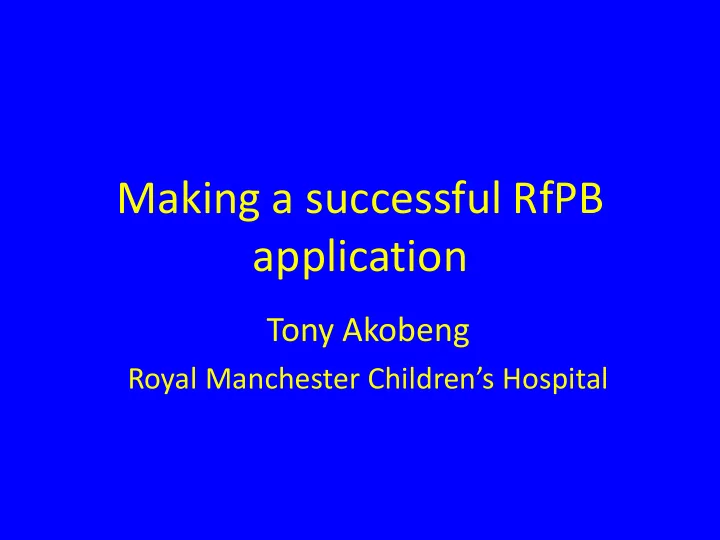

Making a successful RfPB application Tony Akobeng Royal Manchester Children’s Hospital
The project • Telephone consultation as a substitute for routine out-patient face-to-face consultation for children with inflammatory bowel disease: randomised controlled trial and economic evaluation
Initial idea of study • Long standing • Parents phoning and saying “my child is very well, do we really need to attend” • Patients with flare-up of disease unable to have a quick access to clinics • Many patients attending routine appointments when well
RfPB? • Knew little about programme till attending NW RDS meeting in ?Preston • Wondered whether the Telephone idea will be eligible for the programme
Is the project within the scope and aims of the RfPB? • Extensive reading of information on RfPB website including Director’s messages, etc – Project must be related to day-to-day practice of NHS staff – Evaluate the effectiveness and cost effectiveness of interventions; – Examine the resource utilisation of alternative means for healthcare delivery; – Must be able to show a demonstrable impact on patients – Patient involvement necessary
RDS support • Adam Garrow – Several useful discussions – Helped clarified aspects of programme – Suggested some key people to contact e.g. PPI involvement
Building the team • Must be able to deliver all aspects of the project • Must have a wide range of skills • NOT JUST CLINICIANS!! • Multidisciplinary approach essential • Should be able to justify why somebody is a co-applicant
The ideal team • Statisticians • Patients and parents/guardians • Doctors • Nurses • NHS Managers • Research methodologists • Health economist
Building the team • STATISTICIAN • Clinicians • Nurse • Health economist • NHS managers
Building the team – initial issues • Try to convince key people about the importance of the research question • WHERE IS THE PROTOCOL???? – “We want to see a draft before committing”
Drafting the protocol • Long process – pay attention to detail • Clearly show HOW the research question will directly benefit patients – change in professional practice – Change in the way the service is delivered – Cost-effectiveness to both patients and NHS
The protocol • Background • Hypothesis • Aims • Methods – Setting and participants – Study design & Plan of study • Randomisation • Procedures
Protocol (cont’d) • Outcome measures – Primary – Secondary • Data collection • Ethics • Sample size and statistical methods • Management and governance • References
Team meeting • STATISTICIAN • Clinicians • Nurse • Health economist • NHS managers
Informal Peer review • Protocol reviewed and commented upon by each member of team • Informal internal and external peer review – Very useful comments received
Public and patient involvement • Formal presentation of proposed project to a meeting of patients/carers of children with IBD in North West • Great interest • A number of useful suggestions • Some potential difficulties raised • Protocol sent to Chairman of the national support group for children with IBD: Crohn’s in Children Research Association • Patient/parent representative to be on Steering Committee
The Application • Scientific summary • Lay/plain language summary • Relevance of project to the RfPB programme • Delivery across NHS • Aims • Background • Research plan and methodology • Patient/public involvement • Project plan & justification of costs • Project management • Value for money
Costs • Liaise with finance department early • Consider everything that will ensure the project runs smoothly • Don’t engineer to (at all costs) get your budget to exactly fit the funding available
Summary • Check that your project is within scope of RfPB • Have the right team • Research question should be clear • Patient/public involvement essential • ALLOW PLENTY OF TIME – To plan, prepare protocol & application etc – to liaise with colleagues – peer review etc
Recommend
More recommend